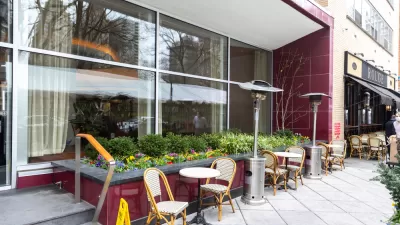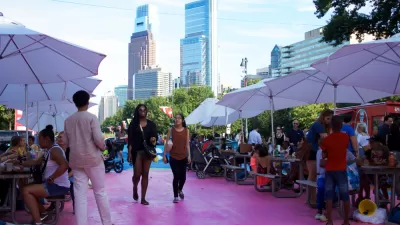Some restaurants have found ways to circumvent the expense of liquor licenses in Philadelphia by opening pop-up beer gardens operating under a much, much cheaper catering permit. Cue state legislation to curb the practice.
"A quartet of state lawmakers are pushing back on Philly's pop-up [beer] gardens, taking issue with something called an off-premise catering permit that allows vendors to 'cater' alcohol sales at these pop-up gardens for months at a time," reports Jon Geeting.
The key to the controversy is the Prohibition-era policy of county quotas, according to Geeting. "The state caps R licenses at 1 license per 3,000 people per county, and the number of licenses in Philadelphia has actually been declining as the population has grown, as many have been taken out of circulation due to liens and violations."
Washington D.C.'s liquor licenses sell for $9,000-11,000, so Philadelphia's $85,000 liquor licenses constitute a significant barrier to entry into the bar and restaurant business by comparison.
"That's what makes the pop-up beer gardens so innovative," explains Geeting, "a restaurant with a liquor license can obtain an off-site catering permit for $500 to extend that license to another location, and cater one of these temporary outdoor bars for a few months in the summer and fall. The legality of a single permit holder serving the same beer garden for months at a time is what state lawmakers are contesting…"
FULL STORY: The Prohibition-era policy driving the political scuffle over pop-up beer gardens

Planetizen Federal Action Tracker
A weekly monitor of how Trump’s orders and actions are impacting planners and planning in America.

San Francisco's School District Spent $105M To Build Affordable Housing for Teachers — And That's Just the Beginning
SFUSD joins a growing list of school districts using their land holdings to address housing affordability challenges faced by their own employees.

The Tiny, Adorable $7,000 Car Turning Japan Onto EVs
The single seat Mibot charges from a regular plug as quickly as an iPad, and is about half the price of an average EV.

Seattle's Plan for Adopting Driverless Cars
Equity, safety, accessibility and affordability are front of mind as the city prepares for robotaxis and other autonomous vehicles.

As Trump Phases Out FEMA, Is It Time to Flee the Floodplains?
With less federal funding available for disaster relief efforts, the need to relocate at-risk communities is more urgent than ever.

With Protected Lanes, 460% More People Commute by Bike
For those needing more ammo, more data proving what we already knew is here.
Urban Design for Planners 1: Software Tools
This six-course series explores essential urban design concepts using open source software and equips planners with the tools they need to participate fully in the urban design process.
Planning for Universal Design
Learn the tools for implementing Universal Design in planning regulations.
Smith Gee Studio
City of Charlotte
City of Camden Redevelopment Agency
City of Astoria
Transportation Research & Education Center (TREC) at Portland State University
US High Speed Rail Association
City of Camden Redevelopment Agency
Municipality of Princeton (NJ)




























